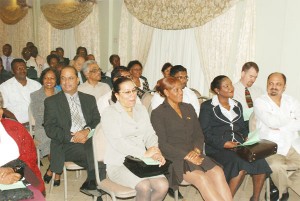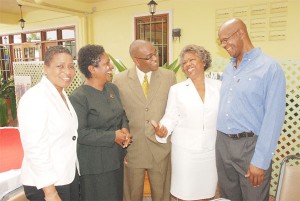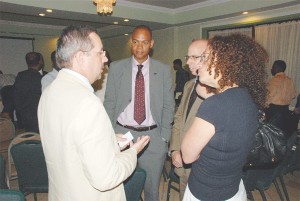 By Miranda La Rose
By Miranda La Rose
There are no rules governing the media’s coverage of parliament at present but at some point in the future there would be need for a set of agreed “principles”, Speaker of the National Assembly Ralph Ramkarran said.
In opening remarks at a four-day workshop on parliament and the media at the Grand Coastal Inn at Le Ressouvenir, East Coast Demerara yesterday, Ramkarran said that if the media are unable to accept such rules inevitably Parlia-ment would have to legislate to protect the rights, duties and responsibilities of parliamentarians.
While noting that parliament’s experience with the media has been fairly good, he pointed out that one of the recommendations made by a Commonwealth parliamentary expert for improving coverage was for a set of guidelines approved by a parliamentary select committee with equal numbers of government and opposition MPs. However, when put to the media this proposal was rejected.
Ramkarran said that the topics chosen for the workshop which included the role of the media as the fourth estate and speeches and speaking in parliament were part of an ongoing effort to improve and involve the public in the work of parliament and giving them a chance to make informed choices.
In remarks as an opposition member of parliament, AFC MP Raphael Trotman said that the seminar came at a time when in the opinion of the opposition freedom of the press was under threat by both state and non-state actors. He said that recent events involving Stabroek News which had it state advertising withdrawn for 17 months and CNS Channel 6 which had its licence suspended for four months were examples of this. He also adverted to the continuing exclusion of the opposition and civil society from the state-owned media and the refusal to share information on matters of public interest such as the sale of state assets. He said these examples have brought the notions of the right to information, freedom of the press and the responsibilities of the media into sharp focus.
Trotman expressed the hope that the workshop would serve to better define expected roles and responsibilities as media workers and lawmakers and he expected that “uninformed statements like the ones which say that that the judiciary is threatening and challenging the executive and that the media is attempting to bring down the government will be banished from our discourse as those who make them will become educated and edified as to our roles as legislators and media practitioners.”
 Biased
Biased
From the legislator’s point of view, he said that too many times there are improperly researched reports, riddled with errors and overtly biased and it becomes the media’s duty to be fair and balanced.
Speaking of the Freedom of Information (FOI) Bill which he submitted to parliament since 2006, he said that access to information was now the most precious of rights and the most basic of human necessities in a changing and sometimes perilous world.
He could see no upstanding reason why any government in the 21st century would wish to suppress or disallow the right to information and efforts to enshrine that right.
He noted that after some reservation the main opposition PNCR has publicly signalled its support but to date the governing PPP/C has not. Disappointingly too, he said, the Guyana Press Association and others with an interest in democracy have not done sufficient work to advance the passage of the FOI bill.
The sessions which followed the opening of the workshop, particularly the one on the media as the fourth estate in which Guyana-born British MP Baroness Valerie Amos and Trinidad and Tobago journalist Sasha Mohamed were the lead presenters led to a lively debate in which there was a focus on the media holding the government as well as the opposition accountable to the electorate.
It was felt by some that the media should hold the government “more accountable” than the opposition since the opposition was deemed to be powerless in the Westminster parliamentary system.On the other hand, Baroness Amos did not share the view that the opposition was “powerless” in the Westminster system. She said that in Britain, and in several developed and developing countries the opposition has made strategic decisions that have impacted on the lives of its citizenry.
While it would also appear that in Guyana and in some parliaments that MPs do not veer outside of the party’s thinking in votes on critical bills and issues, she noted that some MPs of the government or opposition may not hold the same view as the political party they represent and were free to object by abstaining.
The Baroness, as well as participants – mainly MPs from the floor, was of the view that the mainstream media did not understand parliamentary matters very well and that journalists needed to be educated on parliamentary procedures and other parliamentary matters.
 It was pointed out that while journalists focused on the coverage of parliamentary debates in the National Assembly there was little or no attention to the parliamentary sectoral committees which are also open to the media.
It was pointed out that while journalists focused on the coverage of parliamentary debates in the National Assembly there was little or no attention to the parliamentary sectoral committees which are also open to the media.
It was felt by the MPs that much of the workings of parliament happen in the committees.
She noted, too, that the general British populace which she represents was not interested in parliamentary matters and as such there was need for citizenship education on parliamentary matters. This was a role which the media should be involved in, however, one of the questions was how could a sometimes confused media educate the citizenry.
Suggestions from the floor also included regulating the media and placing restrictions since there was a belief that politicians have “surrogates in the media.” PNCR-1G MP Winston Murray suggested that one media house had created a political party.
In the same way that the media report on corruption in government it was suggested, too, that the media were defined by their owners, whether privately owned or state-owned, and were biased. The issue of the lack of access to the state-owed media by the opposition was also raised by the opposition MPs.
On reporting of public figures and critical and fair comments, some MPs felt they were unnecessarily targeted in libellous reports with little or no recourse for redress. The discussion on where the lines should be drawn on reporting on the public and private lives of public officials and their immediate family members also engendered a strong debate.
Baroness Amos and Trinidad and Tobago’s Minister of Information Neil Parsanal noted the functioning of press complaints committees in their respective countries as a means of addressing some of the “unfair” reports. It was noted, however that the press complaints commissions were established by the media themselves.
The workshop continues today with presentations on ‘Coverage of the National Assembly,’ and ‘Speeches and Speaking in Parliament.’
Among the presenters today are Bermuda MP John Barritt and Communications Coordinator of the Trinidad and Tobago Parliament Jason Elcock and the Political Editor of the Trinidad and Tobago Express Ria Taitt.






